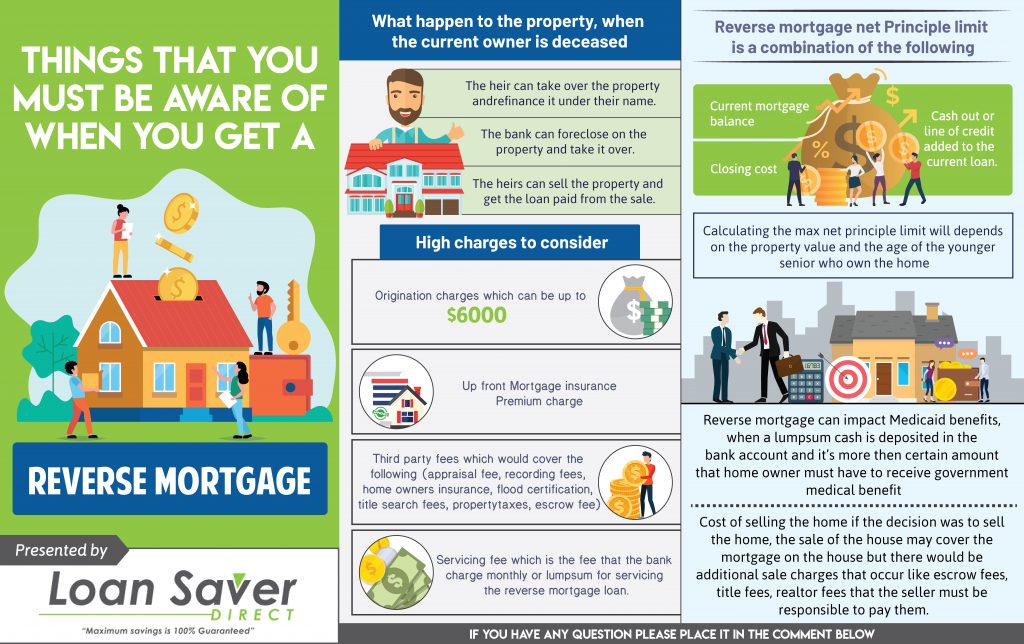
Homeowners can benefit from a reverse mortgage, as it enables them to get some income from the equity they have been building over time in their homes. Such income can be offered as a lump sum or as installments, allowing seniors to get some cash to live on. With this option, seniors don’t have to struggle in their old age. However, there are several pitfalls that one needs to consider before making a decision, so let’s get to business and discuss them:
Contents:
- Kids may never get to inherit the home
- Consider high charges
- A reverse mortgage can impact Medicaid benefits
- Additional pitfalls
Kids may never get to inherit the home
It’s common for parents to transfer ownership of their house to their kids, especially when it’s a family home. In a situation where a reverse mortgage has been taken out, the mortgagee has to service the loan according to the set agreement. Though the lending institution will not take ownership of the home, most are the times when repayment has to be done by selling the property and then transferring the total proceeds or just a part to the bank.
To circumvent such situations, the best thing to do would be to take out an insurance policy on the owner of the home and then make a lending institution or an adult child the beneficiary. By doing so, the bank can still be repaid without having to sell the home even if the property owner passes on. Before taking such a step, however, it should be a top priority to get advice from an insurance agent as to whether proceeds from the policy will be enough for the outstanding loan.
Consider high charges
Most of the Home Equity Conversion Mortgages (HECMs) reverse mortgages accessible through the Federal Housing Authority (FHA) are insured by the Federal government. These mortgages, however, come with several fees which can be paid upfront or over time. A good example of the ones that can be paid upfront is appraisal fees while servicing fee is a perfect example of what someone can pay over time. Let’s have a look at some of the charges that can affect the income that someone can get from a reverse mortgage:
Origination charges
The main reason behind origination fees is to compensate a lender for processing the homeowner’s loan. The fees may range from one lender to the next, though they are capped by the FHA. $2,500 is capped for homes that are worth $125,000 or less. If a home has a value of more than $125,000, up to 2% will be charged for the first $200,000, and 1% for the remaining value that is over $200,000.
Mortgage insurance premium
You need an FHA mortgage insurance which is meant to ensure that you receive loan advances as expected. This insurance attracts a fee referred to as a mortgage insurance premium (MIP), which the homeowner can opt to finance as part of their loan.
Third-party fees
Third-party closing costs can include an appraisal charge whose average is mostly $450 (the amount depends on location), insurance, inspections, mortgage tax, recording fees, pest inspection (approximately $100), title search (depends on loan amount and region as well), flood certification fee (ranges from $20 to $30), and others.
Servicing fee
Lender or agents provide servicing which may include sending accounts statements to the homeowner, disbursing loan process, and ensuring that a homeowner heeds to the loan requirements (paying hazard insurance premium and real estate taxes). As such, a servicing fee that should not be more than $30 can be charged by the lender is a loan has a fixed interest rate or has an annually adjusting rate.
The lender will then set aside the servicing fee at the loan closing and settle the difference from available funds. The servicing fee is added to your loan balance every month. A lender may also decide to have the servicing fee included in the mortgage interest rate.
Since the process has a considerable upfront cost, a homeowner who may need to have their home sold in a few years to come should consider going for a more traditional line of credit. Such credit may be something like a personal loan or a home-equity loan.

A reverse mortgage can impact Medicaid benefits
Lending institutions try to convince homeowners that a reverse mortgage should not affect their Medicaid payments. For the claim to be true, however, the loan has to be carefully structured. A lump-sum payment, for example, should count as an asset that has to be spent down before a homeowner becomes eligible for Medicaid benefits.
LongTermCare.gov from the U.S. Department of Health and Human Services, however, specifies that the money is not taxable and should not affect Medicare benefits or Social Security not should it count towards income as long as one uses the payments they receive during the month they receive them. These payments should also not be considered as income for Medicaid eligibility.
You should also keep in mind that if the total liquid resources are more than $2,000 for an individual or $3,000 for a couple, this could make someone ineligible for Medicaid. If you, however, spend your monthly payments without accumulating savings, you should be good to go.
Anyone who is currently benefiting or anticipates to receive Medicaid in the future should consider getting advice from a financial advisor or accountant on the complications of having a reverse mortgage.
Additional pitfalls
Lending institutions are not authorized to get more than your home’s appraised value or get money from your heirs. However, there are additional pitfalls associated with reverse mortgages that include the following;
One may get less than what they anticipated
You have to consider that your home is subject to an appraisal, and even if you have used a lot of money on it previously, it may be worth lesser what you paid. As such, you may end up getting lesser proceeds from the mortgage than you expected.
You are still responsible for other payments
One should consider that as a homeowner, they still have the responsibility to clear all taxes, as well as pay for insurance and upkeep of their home. Failure to do so may lead to the loan being called in.
You may be forced to sell
Some reverse mortgages clearly state that a loan has to be repaid in case the last surviving borrower moves out of the home permanently. Imagine a situation where one stays in the hospital for a long period receiving medical treatment, only to go back and find that their home is in foreclosure. Such a situation makes some reverse mortgages quite risky as you can never predict what may happen. If in any case, you are in a situation that is considered as a “permanent move,” you risk losing your home just like that.
Final Remarks
Reverse mortgages can go a long way in helping homeowners benefit from the equity in their homes, whether as a lump sum or in installments. However, it so important that you consider the potential pitfalls that could make a reverse mortgage not worth it.
